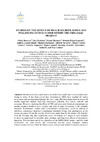Identificador persistente para citar o vincular este elemento:
https://accedacris.ulpgc.es/jspui/handle/10553/132181
| Título: | Studies on the effect of beach microplastics and pellets ingestion in fish within the Implamac Project | Autores/as: | Herrera, A. Martínez, I. Montero, D. Pérez-Luzardo, O. Acosta Dacal, Andrea Carolina Zumbado, M. Navarro Molina, Alberto Torres Gómez,Álvaro Nogueira, Natacha Canada, Paula Almeda, R. Autiero, Alexandro Gómez, M. |
Clasificación UNESCO: | 3105 Peces y fauna silvestre 331210 Plásticos 330811 Control de la contaminación del agua |
Palabras clave: | Microplastics Pellets Chemical pollutants Bioaccumulation Biomarkers |
Fecha de publicación: | 2024 | Proyectos: | Evaluación del impacto de microplásticos y contaminantes emergentes en las costas de la Macaronesia | Conferencia: | III International Workshop on Marine Litter (BAMAR 2024) | Resumen: | Marine microplastic pollution is one of the most significant environmental issues facing us today. It has been shown that microplastics (MPs) have reached all marine ecosystems and are transferred through the food chain. MPs have been found in almost all marine organisms studied, including crustaceans, jellyfish, fish, turtles, seabirds, and cetaceans. However, studying the effects of MPs and associated chemical contaminants on marine organism health is more complex and there is some controversy in the scientific literature. Furthermore, studies with environmental microplastics, which in addition to additives, concentrate chemical contaminants absorbed during their permanence in the ocean, are scarce. Given the severity of this issue, made clear by the recent spill of pellets from the Toconao ship that reached the coasts of Galicia, it is urgent to seek scientific evidence to understand the possible short, medium, and long-term effects of microplastic ingestion. This has been one of the objectives of the IMPLAMAC project, and this work summarizes the main results and conclusions reached, using European seabass (Dicentrarchus labrax), zebrafish (Danio rerio), and gilthead seabream (Sparus aurata) as experimental organisms [...] | URI: | https://accedacris.ulpgc.es/handle/10553/132181 |
| Colección: | Ponencias |
Visitas 5
259
actualizado el 27-sep-2025
Descargas
101
actualizado el 27-sep-2025
Google ScholarTM
Verifica
Comparte
Exporta metadatos
Los elementos en ULPGC accedaCRIS están protegidos por derechos de autor con todos los derechos reservados, a menos que se indique lo contrario.
